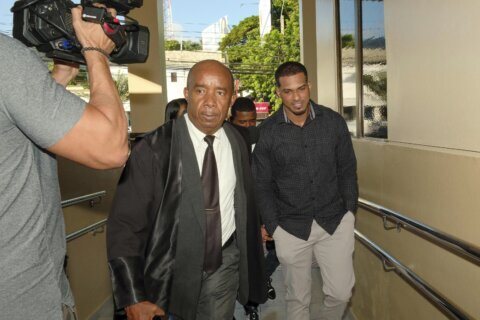SAN JUAN, Puerto Rico (AP) — A top court in the Dominican Republic has agreed to review a challenge to laws dating from the last century that criminalize gay sex involving members of the army and police force.
It’s the first time in recent history that someone in the socially conservative Caribbean country has challenged laws that punish such actions with up to two years in prison for police and one year for the military.
While prosecutions are rare, “that’s never the end of the story,” said Cristian González Cabrera, senior researcher at Human Rights Watch, in an interview Saturday.
“The laws single out a vulnerable social group, giving legal sanction for discrimination, violence, and prejudice against (LGTBQ+) people,” he said.
The Dominican Republic’s Constitutional Court heard the case on Friday and is now deliberating the laws that date from 1953 for the army and 1966 for the police. The 50-page challenge submitted to the court states that the laws constitute “a constant threat and risk that rests like a guillotine over their heads every day of service.”
It’s not clear how many members of the army and police have been sanctioned or dismissed for allegedly violating the laws, mostly because many are hesitant to come forward and make their case public.
In 2019, a Dominican army sergeant was dismissed after a video showing him having sex with another man went viral. He appealed the decision, with a court dismissing his case in 2021, which he also appealed and is awaiting a ruling, according to Human Rights Watch.
In another case that was not publicized, a female police officer was ordered by her superiors to six months in prison but did not contest the order because she did not want to be formally identified in documents as a lesbian, fearing backlash, said Anderson Dirocie, one of two attorneys challenging the laws.
“It’s not common for people to come out of the closet here,” he said, noting widespread stigma despite the country allowing gay sex among private individuals. “There are no real rights nor real protections for (LGTBQ+) people.”
As a gay Black man, Dirocie said Saturday that he decided to challenge the laws along with another attorney, even though rulings from the Constitutional Court are final and cannot be appealed. The court composed of 13 judges has four months to issue a ruling, and a minimum of a nine-member majority is required.
Dirocie noted the country’s attorney general must rule on any direct challenges to the constitution and that it approved the one they submitted to the court.
Countries that have struck down similar laws include Venezuela, Peru, Ecuador and the U.S., where gays and lesbians were banned from serving in the military until 1993, when a “don’t ask, don’t tell” policy that ended in 2011 allowed them to serve as long as they kept quiet about their sexual orientation. Overall, the U.S. military dismissed more than 100,000 service members based on their sexual or gender identities.
Copyright © 2024 The Associated Press. All rights reserved. This material may not be published, broadcast, written or redistributed.






